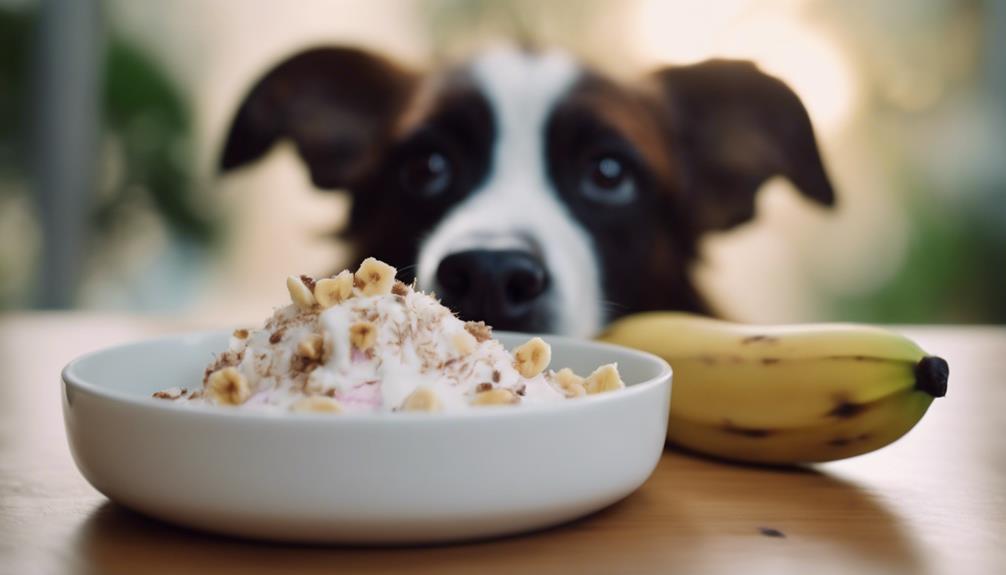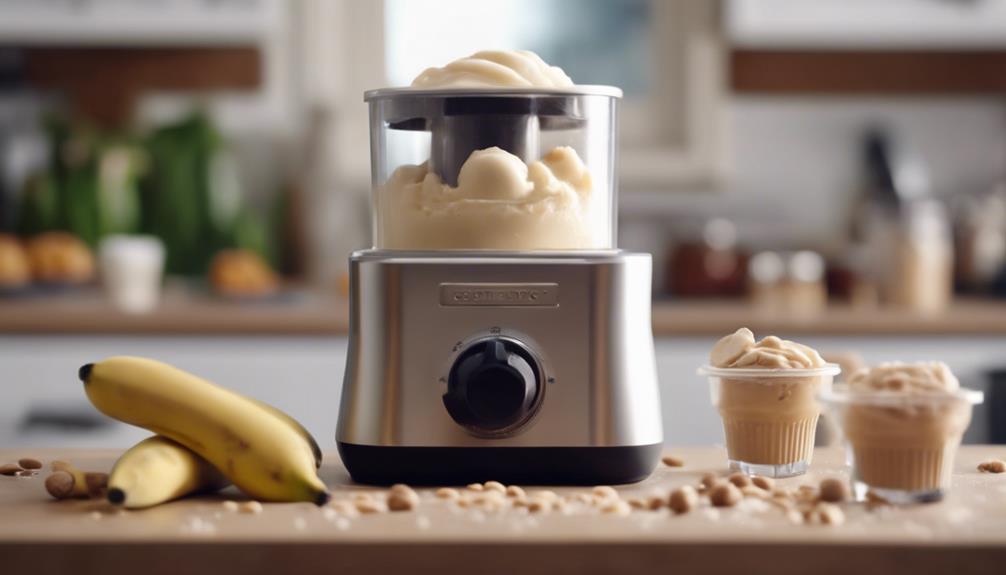When it comes to sharing ice cream with your canine companion, the topic is not as straightforward as one might assume.
While the idea of treating your pup to a scoop of this sweet delight may seem harmless, there are crucial factors to consider.
From potential digestive issues to specific ingredients that can be harmful to dogs, navigating the world of ice cream sharing requires careful attention.
By exploring the dos and don'ts of this indulgence, pet owners can ensure their furry friends enjoy this treat safely and responsibly.
Key Takeaways
- Some dogs may tolerate dairy, but many are sensitive to it, causing digestive issues.
- Stick to safe options like plain vanilla or fruit-flavored sorbet in small amounts.
- Avoid dangerous flavors like chocolate, coffee, and sugar-free varieties to prevent toxicity.
- Opt for healthier alternatives like non-fat yogurt or homemade dog ice cream for a safer treat option.
Risks of Feeding Dogs Ice Cream
Feeding ice cream to dogs can pose various risks due to their potential sensitivity to dairy and the potential adverse effects it can have on their digestive system, including upset stomach, vomiting, diarrhea, and even pancreatitis.
Dairy products like ice cream can be hard for dogs to digest, leading to gastrointestinal issues. While some dogs may tolerate small amounts of ice cream, many can experience discomfort or more severe complications.
It is essential for pet owners to be cautious when giving their dogs ice cream and to monitor their reactions closely. If unsure about a dog's tolerance to dairy, it is best to avoid feeding them ice cream altogether to prevent any potential harm or discomfort.
Safe Ice Cream Options for Dogs
When considering safe options for dogs to enjoy ice cream, it is important to prioritize plain vanilla or fruit-flavored sorbet to minimize potential risks associated with dairy sensitivity. While some dogs may handle dairy well, many can experience digestive issues when consuming ice cream.
To keep your furry friend safe and happy, consider the following:
- Opt for plain vanilla or fruit-flavored sorbet.
- Avoid adventurous flavors and toppings.
- Test your dog's tolerance with a small amount initially.
Avoiding Ice Cream With Health Issues

In light of potential health issues in dogs, it is advisable to steer clear of feeding ice cream to avoid exacerbating any existing conditions or sensitivities. Ice cream, with its dairy content and often high sugar levels, can lead to digestive problems and other health issues in dogs. Here is a comparison table to highlight the risks of feeding ice cream to dogs:
| Health Issues | Risks of Feeding Ice Cream |
|---|---|
| Upset stomach | Dairy and sugar content can cause gastrointestinal upset. |
| Vomiting | Dogs may have trouble digesting dairy, leading to vomiting. |
| Diarrhea | High sugar levels in ice cream can trigger diarrhea in dogs. |
| Pancreatitis | Fatty ice cream can potentially cause pancreatitis in dogs. |
| Sensitivities | Dogs with lactose intolerance can suffer from digestive distress. |
Understanding these risks can help dog owners make informed decisions when it comes to sharing ice cream with their furry companions.
Dangerous Ice Cream Flavors for Dogs
Dogs should steer clear of ice cream flavors containing chocolate, coffee, green tea, or sugar-free additives due to potential health risks. These flavors can be harmful to dogs due to certain ingredients. When sharing ice cream with your furry friend, opt for safe flavors like plain vanilla or fruit sorbet.
Dangerous ice cream flavors for dogs include:
- Chocolate
- Coffee
- Green tea
These flavors contain substances that are toxic to dogs and should be avoided at all costs. Stick to safer options to ensure your pup's well-being when indulging in this frozen treat.
Ice Cream Additives to Avoid

Certain additives commonly found in ice cream can pose health risks to dogs and should be avoided to ensure their well-being. Dogs should not consume ice cream containing xylitol, as it is toxic and can lead to severe health issues such as low blood sugar or liver damage.
Additionally, ice cream with chocolate or caffeine should be strictly avoided, as these ingredients are harmful to dogs and can cause symptoms ranging from vomiting and diarrhea to seizures and even death. Artificial sweeteners like erythritol and sorbitol can also be dangerous for dogs, leading to digestive upset and potential toxicity.
To keep your pup safe, always check the ingredients list and opt for plain, simple flavors when sharing ice cream with your furry friend.
Healthier Treat Alternatives for Dogs
For a more nutritious option to indulge your canine companion, consider exploring healthier treat alternatives. These options not only provide a tasty snack but also contribute to your dog's well-being:
- Italian frozen ice
- Non-fat yogurt
- Fat-free cream cheese
These treats offer a healthier alternative to traditional ice cream, which can be high in sugar and fat. Italian frozen ice, non-fat yogurt, and fat-free cream cheese are lighter options that can still satisfy your pup's cravings. Remember to feed these treats in moderation to maintain a balanced diet for your furry friend.
Your dog will surely appreciate these delicious and healthier alternatives to regular ice cream.
Homemade Dog Ice Cream Recipe

Craft an enticing and nutritious frozen treat for your furry companion with this simple homemade dog ice cream recipe.
To prepare this healthy alternative, gather plain Greek nonfat yogurt and a sliced banana. Blend the ingredients until smooth and creamy.
Pour the mixture into an ice cube tray and freeze for at least two hours. For added variety, consider customizing the recipe with peanut butter, honey, or other dog-safe fruits.
This homemade dog ice cream provides a safe and delicious option for your pup to enjoy without the potential risks associated with traditional ice cream. Remember to offer this treat in moderation as part of a balanced diet for your canine companion.
Monitoring Dogs' Ice Cream Intake
To ensure the well-being of your furry companion, it is essential to carefully regulate and monitor their intake of ice cream, considering the potential risks associated with traditional varieties. When sharing this sweet treat with your pup, keep the following points in mind:
- Watch for signs of sensitivity or intolerance after consumption.
- Limit the amount of ice cream given to prevent digestive issues.
- Consider opting for safer alternatives like plain vanilla or fruit-flavored sorbet.
Signs of Ice Cream Sensitivity in Dogs

Dogs may exhibit signs of ice cream sensitivity through various physical and behavioral indicators. Common physical symptoms include vomiting, diarrhea, gas, bloating, and itching, especially around the face and paws.
Behavioral signs can manifest as excessive scratching, restlessness, or changes in mood or energy levels. Additionally, some dogs may display signs of lactose intolerance, such as flatulence or discomfort after consuming dairy-based ice cream.
It's important to monitor your dog closely after feeding them ice cream and seek veterinary advice if any concerning symptoms arise. Recognizing these signs early can help prevent further complications and ensure your pup's well-being when sharing this sweet treat.
Ice Cream Toppings to Skip
After discussing signs of ice cream sensitivity in dogs, it is essential to be mindful of certain ice cream toppings that should be avoided to ensure your dog's safety and well-being. When sharing this sweet treat with your pup, consider skipping the following toppings:
- Chocolate: Toxic to dogs and can cause various health issues.
- Nuts: Can lead to digestive problems and pose a choking hazard.
- Xylitol: Found in sugar-free ice cream, it is extremely toxic to dogs.
Moderation and Balance in Treats

When considering treats for your furry companion, ensuring moderation and balance is crucial for maintaining their overall health and well-being. Treats should be a small part of your dog's diet, complementing their main meals without causing nutritional imbalances. Here is a breakdown of key points to keep in mind:
| Moderation | Balance |
|---|---|
| Offer treats occasionally | Ensure treats are nutritionally balanced |
| Control portion sizes | Consider your dog's overall calorie intake |
| Monitor weight gain | Choose treats that provide added vitamins or minerals |
| Use treats for training or special occasions | Be mindful of any dietary restrictions or allergies |
Conclusion
In conclusion, understanding the risks and benefits of feeding dogs ice cream is crucial for responsible pet ownership. By exploring safe options, avoiding harmful flavors and additives, monitoring intake, and promoting moderation, pet owners can make informed decisions for their canine companions' well-being.
It is essential to prioritize the health and safety of dogs when sharing treats like ice cream, ensuring that they enjoy a balanced diet and lifestyle.




